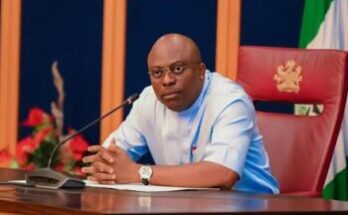Our correspondent, BENJAMIN UMUTEME, examines the 2018 Appropriation Bill laid before the National Assembly and fears that the 2018 budget might just be another yearly ritual, especially with debt repayment and deficit financing taking a large chunk of the budget
When President Muhammadu Buhari laid the 2018 budget estimates on Tuesday before the joint session of the National Assembly, he said the budget was meant to consolidate on the 2017 budget. He assured that the budget will deliver on the Economic Recovery and Growth Plan (ERGP).
Giving an overview of the 2017 budget performance, the President said: “On the expenditure side, a total of N450 billion of the capital vote had been released as at the end of October 2017,” even as he added that with the support of the NASS the government plans to release up to 50 per cent of capital votes for MDAs by the end of the year.
He however noted that the late passage of the 2017 budget by the legislature significantly constrained 2017 budget implementation. “As you are aware, the 1999 constitution authorizes necessary federal government expenditures prior to 12th of June, 2017 when the 2017 Appropriation Act was signed into law,” he added.
Budget assumptions and projections
According to the president, the budget proposal is based on key parameters of:
Benchmark crude oil price of $45 per barrel; Oil production estimates of 2.3 million barrels per day; Exchange rate of $305/USD; Real GDP growth of 3.5 per cent; and Inflation rate of 12.4 per cent. This is even as he said the government plans an aggregate expenditure of N8.61 trillion with recurrent expenditure expected to gulp N3.494 trillion; statutory transfers N456 billion; sinking funds N220 billion (to retire maturing bonds to local contractors); capital expenditure of N2.428 trillion (excluding the capital component of the statutory transfers; and debt servicing N2.014 trillion. He further explained that a total of N11.983 trillion is estimated to be collectible revenues for the federation in the fiscal year out of which the sum of N6.387 trillion is expected to be realized from oil and gas sources while total receipt from non oil sector is projected at N5.597 trillion.
Sectoral breakdown
A breakdown of budget estimates revealed that Ministry of Power, Works and Housing (Infrastructure) had the highest sectoral allocation of N555.88 billion, Transport N263.10; Special Intervention N150 billion; Defence N45 billion; and Agriculture and Rural Development N118.98 billion.
Others are: Universal Basic Education Commission N109.06 billion; Zonal Intervention Projects N100 billion; Water Resources N95.11 billion; Industry, Trade and Investment N82.92 billion; Interior N63.26 billion.
Also, Education N61.73 billion; Health N71.11 billion; Federal Capital Territory N40.30 billion; North East Intervention Fund N45 billion; Niger Delta Ministry N53.89 billion and Niger Delta Development Commission N71.20 billion.
Debt and debt servicing question
Another component of the 2018 Appropriation Bill is that N2.01 trillion has been set aside for the debt servicing while another N2.005 trillion will go to finance the deficit and it is expected to be financed by external borrowing and proceeds from the privatization of some government firms as well as proceeds from the oil sector.
The proposed budget has a 16 per cent increase (N8.61 trillion) compared to the 2017 budget of N7.4 trillion is expected to lay emphasis on payment of counterpart obligations on concessionary loans as well as funding of critical infrastructures and other projects that would benefit Nigerians.
According to the President Buhari, “we have prioritised payment of our counterpart obligations on our concessionary loans, as well as funding of critical infrastructure and other projects….Furthermore, MDAs have made provisions to carry over to the 2018 budget, capital projects that are not likely to be fully funded by year-end 2017, to ensure project continuity.”
In separate reports this year, the International Monetary Fund (IMF) and the World Bank have repeatedly warned that development in Sub Saharan Africa is expected to be slow as governments of various countries battle to service the regions’ mounting debt.
According to the World Bank in its African Pulse, as African countries spend a large percentage of their earnings to service debt it becomes increasingly difficult to tackle infrastructural issues which have over the years slowed down development.
For Senior Economist at the World Bank Office in Abuja, Gloria Joseph-Raji, the government should however not lose sight of the fact that the country’s debt-to-revenue ratio has increased by 25 per cent within the past one year alone.
But Minister of Finance, Mrs. Kemi Adeosun had in October affirmed that Nigeria will continue to borrow to drive the economy. According to her, the government would be shifting its focus from domestic borrowing to foreign borrowing to enable the banking sector lend to the private sector.
In spite of the assurance by the president at the budget presentation that the executive would work to cut down the country’s domestic debt by about 60 per cent, while increasing domestic debt to about 40 per cent, Nigeria’s debt will further rise especially as it plan to borrow another $5.5 billion.
“We are closely monitoring our debt service to revenue ratio,” the President said.
Despite this assurance, analysts say Nigeria’s debt was becoming unsustainable. Public policy analysts, Jaye Gaskia says the budget is based on how rather than on realistic planning
According to him, the way the budget will run shows that Nigeria will be borrowing to finance debt servicing in 2018..
He said: “Why make estimates that you can’t meet.”
Buhari further noted that the N8.61 trillion raises the hope of Nigerians, saying that “there is an expectation and that compounds inflationary figures. And that is why it has been difficult to bring down inflation.”
For Chief Executive Officer of BudgiT, Seun Onigbinde, the government should stop acquiring more foreign loans, saying that the burden of paying back in foreign currency will impact negatively on the country’s revenue.
In the same vein, Centre for Social Justice (CSJ) pointed out that allocating so much to debt servicing is an indication that Nigeria’s debt was becoming unsustainable.
The CSO noted that the way it is at the moment Nigeria “may soon be back to the debt situation pre the debt relief period.
Financial experts are of the opinion that the country is hiding under the ‘debt to GDP still within the threshold’ to further ensnare itself in debt.
Many have canvassed that rather than continue to borrow to fund the country’s huge infrastructure deficit, it should turn to the private sector.
But with its mind set on borrowing will the government be open to other options of plunging the deficit in the budget.



